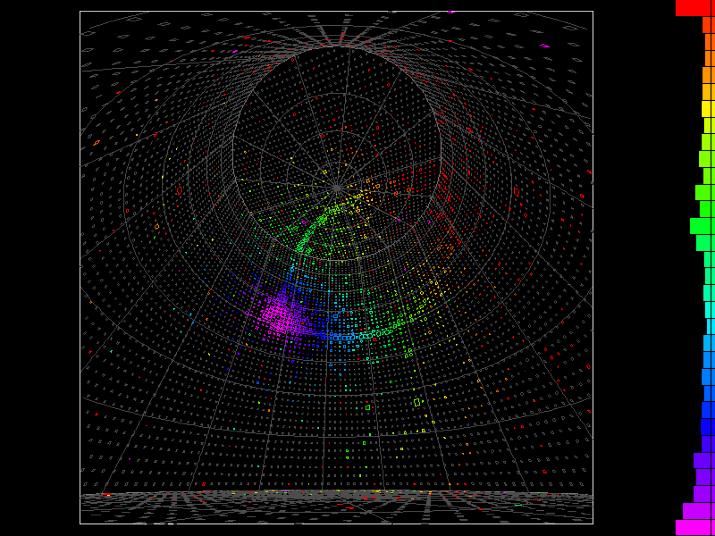
Credit: T2K
New data throws more support behind the theory that neutrinos are the reason the universe is dominated by matter.
The current laws of physics do not explain why matter persists over antimatter – why the universe is made of ‘stuff’. Scientists believe equal amounts of matter and antimatter were created at the beginning of the universe, but this would mean they should have wiped each other out, annihilating the universe as it began.
Instead, physicists suggest there must be differences in the way matter and antimatter behave that explain why matter persisted and now dominates the universe. Each particle of matter has an antimatter equivalent, and neutrinos are no different, with an antimatter equivalent called antineutrinos.
They should be exact opposites in their properties and behaviour, which is what makes them annihilate each other on contact.
Now, an international team of researchers that make up the T2K Collaboration, including Imperial College London scientists, have found the strongest evidence yet that neutrinos and antineutrinos behave differently, and therefore may not wipe each other out. The results are published today in Nature.
Dr Patrick Dunne, from the Department of Physics at Imperial, said: “This result brings us closer than ever before to answering the fundamental question of why the matter in our universe exists. If confirmed – at the moment we’re over 95 per cent sure – it will have profound implications for physics and should point the way to a better understanding of how our universe evolved.”
Previously, scientists have found some differences in behaviour between matter and antimatter versions of subatomic particles called quarks, but the differences observed so far do not seem to be large enough to account for the dominance of matter in the universe.
However, T2K’s new result indicates that the differences in the behaviour of neutrinos and antineutrinos appear to be quite large. Neutrinos are fundamental particles but do not interact with normal matter very strongly, such that around 50 trillion neutrinos from the Sun pass through your body every second.
Neutrinos and antineutrinos can come in three ‘flavours’, known as muon, electron and tau. As they travel, they can ‘oscillate’ – changing into a different flavour. The fact that muon neutrinos oscillate into electron neutrinos was first discovered by the T2K experiment in 2013.
To get the new result, the team fired beams of muon neutrinos and antineutrinos from the J-PARC facility at Tokai, Japan, and detected how many electron neutrinos and antineutrinos arrived at the Super-Kamiokande detector 295km away.
They looked for differences in how the neutrinos or antineutrinos changed flavour, finding neutrinos appear to be much more likely to change than antineutrinos.
The available data also strongly discount the possibility that neutrinos and antineutrinos are as just likely as each other to change flavour. Dr Dunne said: “What our result shows is that we’re more than 95 per cent sure that matter neutrinos and antineutrinos behave differently. This is big news in itself; however we do already know of other particles that have matter-antimatter differences that are too small to explain our matter-dominated universe.
“Therefore, measuring the size of the difference is what matters for determining whether neutrinos can answer this fundamental question. Our result today finds that unlike for other particles, the result in neutrinos is compatible with many of the theories explaining the origin of the universe’s matter dominance.”
While the result is the strongest evidence yet that neutrinos and antineutrinos behave differently, the T2K Collaboration is working to reduce any uncertainties and gather more data by upgrading the detectors and beamlines, including the new Hyper-Kamiokande detector to replace the Super-Kamiokande. A new experiment, called DUNE, is also under construction in the US. Imperial is involved in both.
Imperial researchers have been involved in the T2K Collaboration since 2004, starting with conceptual designs on whiteboards and research and development on novel particle detector components that were key to building this experiment, which was finally completed and turned on in 2010.
For the latest result, the team contributed to the statistical analysis of the results and ensuring the signal they observe is real, as well as including the effects of how neutrinos interact with matter, which is one of the largest uncertainties that go into the analysis.
Professor Yoshi Uchida said: “When we started, we knew that seeing signs of differences between neutrinos and antineutrinos in this way was something that could take decades, if they could ever be seen at all, so it is almost like a dream to have our result be celebrated on the cover of Nature this week.”
###
Media Contact
Hayley Dunning
[email protected]
Original Source
https:/
Related Journal Article
http://dx.




